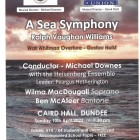Sea Symphony 2022Dundee Choral Union
Read more about the opera Sea Symphony
The First Symphony by Vaughan Williams is one of a handful of his works that remained in regular performance after his death, when most (even The Lark Ascending) fell into neglect for several decades.
As with the previous autumn's Verdi Messa da Requiem this performance saw Dundee Choral Union joining forces with its St Andrews colleagues, while the Younger Hall continued to undergo extensive renovation. This time the regular St Andrews conductor, Michael Downes, was in charge of their regular orchestra, the Heisenberg Ensemble, making its debut in the Dundee hall. The band was, of course, much expanded by comparison with its usual numbers, and made an altogether excelent impression. The players were also able to spread out to fill the generous Caird Hall stage.
The combined choirs produced a nice big sound, even if the Whitman texts were not always ideally clear. There were also some occasional points where the pitch was not ideally true. Nevertheless the performance as a whole was still thoroughly enjoyable. It was very pleasing to see that the Choral Union's own conductor, Derek Clark, had taken the trouble to come through from Glasgow for the day and taken his place among the basses, singing with gusto.
The soloists were also St Andrews regulars, with Ben McAteer having begun his singing career after studying chemistry there. He was on excellent form, projecting clearly into the huge Caird Hall space. Every word came over clearly, showing the benefit of his recent work with Scottish Opera on Gilbert and Sullivan. The previous week he had been with them at Hackney Empire, singing Don Alhambra (The Gondoliers) and King Paramount (Utopia, Limited). Wilma MacDougall was also on excellent form, with a sweet, clearly projected tone.
In previous performances of the Sea Symphony, the DCU have generally preceded it with the increasingly forgotten Elgar cantata The Music Makers. On this occasion, however, the concert began with a great rarity in an orchestral work by Gustav Holst that only received its first public performance as recently as 1982. His Walt Whitman Overture is an entirely appropriate companion piece, as Vaughan Williams adapted verses by Whitman for the symphony. While beautifully orchestrated and full of attractive melody, it did not seem to be characteristic of mature Holst, but was still well worth hearing.
In the autumn the two choirs go their separate ways again, with the Younger Hall once again available. While the planned collaboration was abbreviated due to the Covid pandemic, the two concerts that did happen gave enough of an indication that this collaboration should perhaps be continued from time to time. There are many large scale choral masterworks that neither could tackle alone that we do not hear in this part of the country.
